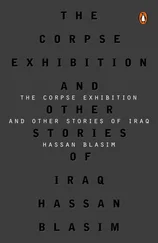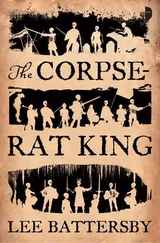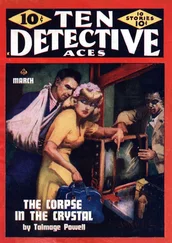I told him that what worried me the most was leaving my mother behind, under the current political situation.
“Of course, but let’s put our heads together and come up with a solution,” he said.
I asked whether he was planning to visit again anytime soon.
“It’s very difficult to get time off from work and, to be honest, I was very happy to see you all, especially you, but my heart was broken. I used to follow the news about Iraq day by day on the radio, newspapers, TV, and recently on the Internet. I never missed a piece of news. I knew the embargo had destroyed the country, but it’s different when you see it with your own eyes. It’s shocking. The entire country and every one in it are tired. I mean even right here in Karrada. Wasn’t this the most beautiful neighborhood? Look at it now. Then you have all this garbage, dust, barbed wires, and tanks. There aren’t any women walking down the street anymore! This is not the Baghdad I’d imagined. Not just in terms of the people. Even the poor palm trees are tired and no one takes care of them. Believe me, these Americans, with their ignorance and racism, will make people long for Saddam’s days.”
The week went by very quickly. On the night before Uncle Sabri’s departure the family gathered to say goodbye. My sister, Shayma’, her husband, Sattar, and their two kids came over. Sattar chatted with my uncle but apologized, as usual, because he was busy with work and stayed only half an hour. Shayma’ said that he was working with one of the Iraqi returnees in a new construction company which was about to get many reconstruction contracts. Upon hearing that, my mother said, “Why don’t they fix the electricity first?” Since there was none, we had lit candles before starting to eat dinner. My uncle joked that in Germany people would pay a lot of money to dine in such a romantic setting.
The next morning he insisted on buying us a satellite dish as a gift. He said that we had to “breathe a bit” and see all that we missed during those years of suffering under the embargo and Saddam. The technician was about to finish programming the satellite dish when the electricity was cut off again, so we agreed that I would pass by his store, which was close by, the next day when the electricity came back on. Eventually, the dish became our only window through which we could see the world and the extent of our own devastation, which multiplied day after day.
Our goodbyes that morning floated in tears as we drank our tea. My mother took Sabri to task for going everywhere around the city but not visiting his brother’s and nephew’s graves. He told her that he never visited graves and didn’t need to see them to remember the people buried there. He put his hand on his heart and said “Ammoury and Abu Ammoury are right here in my heart.”
He gave me an envelope with five hundred American dollars and insisted that I take it to help us get through until things improved. He was confident that we would see each other again in the near future. My mother cried as she hugged him and told him, “Don’t disappear for another twenty-five years!” She sprinkled water behind his car to make sure he returned.
A month after his departure he sent me a long sorrowful and pessimistic article about his visit that he had published online. It was entitled “A Lover Pauses before Iraq’s Ruins.” Its most beautiful section dealt with palm trees:
Iraqis and palm trees. Who resembles whom? There are millions of Iraqis and as many, or perhaps somewhat fewer, palm trees. Some have had their fronds burned. Some have been beheaded. Some have had their backs broken by time, but are still trying to stand. Some have dried bunches of dates. Some have been uprooted, mutilated and exiled from their orchards. Some have allowed invaders to lean on their trunk. Some are combing the winds with their fronds. Some stand in silence. Some have fallen. Some stand tall and raise their heads high despite everything in this vast orchard: Iraq. When will the orchard return to its owners? Not to those who carry axes. Not even to the attendant who assassinates palm trees, no matter what the color of his knife.
When al-Ja’fari was chosen to be the prime minister, my uncle wrote to me: “Marx used to say that ‘history always repeats itself twice, the first time as tragedy, the second time as farce.’ And what we are witnessing now in Iraq is a farce. Who would’ve ever believed that Iraq’s prime minister would be from the Da’wa Party, spear-heading a backward sectarian list? When I left Iraq, the Da’wa Party was banned and later the Americans placed it on the list of terrorist organizations. Now Bush shakes hands with al-Ja’fari? It’s a bizarre world.”
Every evening, I would sit in front of the computer screen for three or four hours, oblivious to the passage of time. I was enchanted by this world — this universe — to which we had had no access during the embargo. Getting the Internet at home was still too expensive, and I didn’t even have a desktop computer, but the fees at the Internet café were reasonable. I would usually start with a quick tour of local and Arab newspaper sites to read what the world was saying about our ongoing disasters. I discovered an Iraqi site called Uruk. It resembled Iraq itself in its political topography and chaos. The administrators allowed anyone and everyone to publish (or at least did not prohibit it), irrespective of their background and leanings. So I would find some profound and penetrating analysis or satire right next to offensive, sectarian, and racist thoughts and never-ending conspiracy theories. Also posted were a lot of documents exposing the new politicians and the corruption, which had gotten out of hand. After reading some of these, I would begin my daily roaming — usually quite random. I started a Hotmail account to correspond with my uncle and try to locate Reem. I was hopeful that I would somehow reconnect with her.
I was proud to learn that some of my classmates who had emigrated years ago had become quite successful. Many had their own websites showcasing their works. But I couldn’t help feeling bitter and jealous when I saw that some who didn’t have a fourth of my talent had established their names in Amman and other places, thanks to good PR. I started to dream of the day when I, too, would have my own website, but I remembered that first I had to start producing art again.
He knocked at the door about a month after Father had passed away. He was in his late forties and short. His gray beard was neatly trimmed and edged with white. He wore round glasses with a silver frame. The bridge of his big nose left a space between his honey-colored eyes. The eyes sat under thick salt-and-pepper eyebrows. He was wearing a flowing black robe and a white turban. After greeting me, he extended his hand and offered his condolences. “May you have a long life, son. I am Sayyid Jamal al-Fartusi. Forgive me, but I heard only yesterday.” I thanked him and invited him in. He told a young man who was driving his car to wait for him. I opened the door to the guest room and showed him in. I gave him a seat and asked my mother to make coffee.
He said he’d known my father for years and had wanted to be at the funeral, but the war and the Americans had prevented him from doing so. A few minutes later my mother knocked at the door. I got up to open it and took the tray from her. I offered him the coffee. He took the cup and the saucer and put it on the table to the right of the chair. After a few sips he asked me about the circumstances of my father’s death. I told him Father had died in the very room we were sitting in while kneeling in prayer. He was moved and repeated twice, “May God be exalted.” Then he said, “May he welcome him in his vast paradise.”
Читать дальше












